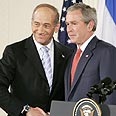
Of course, the memorandum constitutes another important milestone in the special relationship between the two countries, but it is also a good reason for some fresh thinking.
For about 40 years now, the close relationship with the US has been a pillar of Israel's national security. This closeness is premised on shared values and joint interests as well as the political and economic power of the American Jewish community, which is unprecedented in the history of our people.
This reality sees "special ties" between Israel and the US that are manifested through economic aid, political, military, and technological cooperation, and diplomatic support.
This reality is changing. The engine of change is America's floundering in Iraq and the waning hopes for victory there or a quick and elegant exit. In addition, at this time it is hard to see the US acting decisively in order to curb the nuclear project advanced by Iran, which is increasingly reinforcing its status as a regional power with a blatant anti-American agenda.
Moreover, the US is entangled in a series of wars and political struggles involving Afghanistan, Syria, Lebanon, Russia, and the Palestinian Authority. It is hard to see America gaining the upper hand in any of these arenas.
Meanwhile, new forces headed by Russia, China and India are taking front stage in the global theater. These countries are looking to undermine America's status and threaten its interests worldwide.
This reality will lead to a reassessment of America's interests and priorities in the region, to be undertaken at the beginning of 2009 at the latest, as a new administration takes office. It is unclear what new global perception will guide American policy in the post-Bush era and to what extent will Israel maintain its special status.
End of the affair?
Another aspect of this process sees the pro-Israel lobby and US Jewish community under attack. They are being accused of preferring Israeli interests over American ones and of pressuring US decision-makers accordingly. There are voices charging that the pro-Israel lobby is responsible for the Iraqi failure, and a military move in Iran is presented as an Israeli interest more than it is an American interest.
As a result, we cannot reject the possibility that George W Bush's presidency will turn out to be the zenith of the relationship with the US, and we should prepare accordingly.
The core of the Israeli preparation must be premised on reorganization of the foreign policy component in Israel's national security. We must manage this area as we do the defense establishment. That is, the prime minister must make sure that authority and powers are clearly designated for each major issue.
In addition, we must upgrade the manner in which we nurture relationships with emerging powers in the international system. These countries do not have a history of a close relationship with Israel, are not home to a strong Jewish community, and do not share values with Israel.
Therefore, we must formulate a clear strategy and implement it, boost the number of diplomats and the Foreign Ministry's operational budget, and even consider a significant boost in the resources available to Israel's foreign aid apparatus.
The message is simple: We must not become intoxicated by the signing of the new defense memorandum, despite the justified sense of joy. In light of the abovementioned trends, it is important that we start devoting some thought and earmarking some resources ahead of the possibility that one day our wonderful love affair with the US will start to dissipate.
Gidi Grinstein is president of the Reut Institute















